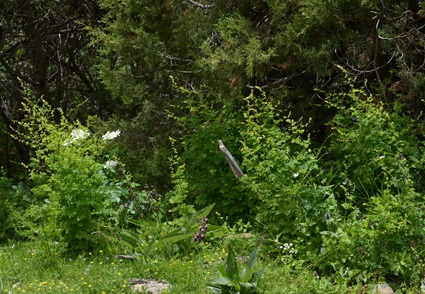Abstract
Based on critical observations on herbarium specimens (including type material) and living plants in the wild, we demonstrate that Thalictrum fusiforme, described from Zayu county in southeastern Xizang (Tibet), China, is conspecific with T. rostellatum, a Sino-Himalayan species widely distributed in Bhutan, China (southwestern and southeastern Xizang, northwestern Yunnan), northern India, and Nepal. We therefore reduce T. fusiforme to the synonymy of T. rostellatum herein. The geographical distribution of T. rostellatum in China is also clarified through the correction of some misidentifications, and lectotypification is proposed for T. rostellatum.
References
<p>Blume, C.L. (1825) Ranunculaceae. <em>In</em>: <em>Bijdragen tot de flora van Nederlandsch Indië</em>. Ter Lands Drukkerij, Batavia, pp. 1‒3. https://doi.org/10.5962/bhl.title.115427</p>
<p>Finet, A.E. & Gagnepain, F. (1903) Contributions a la flore de l’Asie orientale d’aprés l’herbier du muséum de Paris. <em>Bulletin de la Société Botanique de France</em> 50: 600–625.</p>
<p>Franchet, A. (1889‒1890) <em>Plantae Delavayanae</em>. Paul Klincksieck, Paris, 240 pp. https://doi.org/10.5962/bhl.title.10529</p>
<p>Fu, D.Z. & Zhu, G. (2001) <em>Thalictrum</em> Linnaeus. <em>In</em>: Wu, Z.Y., Raven, P.H. & Hong, D.Y. (Eds.) <em>Flora of China</em>, vol. 6. Science Press, Beijing & Missouri Botanical Garden Press, St. Louis, pp. 282–302.</p>
<p>Grierson, A.J.C. (1984) Ranunculaceae. <em>In</em>: Grierson, A.J.C. & Long, D.G. (Eds.) <em>Flora of Bhutan</em>, vol. 1, part 2. Royal Botanical Garden, Edinburgh, London, pp. 283−321.</p>
<p>Hara, H. (1979) Ranunculaceae. <em>In</em>: Hara, H. & Williams, L.H.J. (Eds.) <em>An Enumeration of the Flowering Plants of Nepal</em>, vol. 2. British Museum (Natural History), London, pp. 9–23.</p>
<p>Hooker, J.D. & Thomson, T. (1855) Ranunculaceae. <em>In</em>: Hooker, J.D. & Thomson, T. (Eds.) <em>Flora Indica</em>, vol. 1. W. Pamplin, London, pp. 1–60.</p>
<p>Lecoyer, J.C. (1885) Monographie du genre <em>Thalictrum</em>. <em>Bulletin de la Société Royale de Botanique de Belgique</em> 24: 78–324.</p>
<p>Li, H. & Li, R. (2020) <em>Plant Resources and Geography of the Gaoligong Mountains in Southeast Tibet</em>. Hubei Science and Technology Press, Wuhan, 1258 pp.</p>
<p>Linnaeus, C. (1753) <em>Species Plantarum</em>. Laurentii Salvii, Holmiae, 1200 pp.</p>
<p>Marquand, C.V.B. (1929) The botanical collection made by Captain F. Kingdon Ward in the eastern Himalaya and Tibet in 1924–1925. <em>Journal of the Linnean Society of London, Botany</em> 48: 149–229. https://doi.org/10.1111/j.1095-8339.1929.tb00587.x</p>
<p>McNeill, J. (2014) Holotype specimens and type citations: General issues. <em>Taxon</em> 63: 1112−1113. https://doi.org/10.12705/635.7</p>
<p>Rau, M.A. (1993) Ranunculaceae. <em>In</em>: Sharma, B.D., Balakrishnan, N.P., Rao, R.R. & Hajra, P.K. (Eds.) <em>Flora of India</em>, vol. 1. Botanical Survey of India, Calcutta, pp. 1–145.</p>
<p>Turland, N.J., Wiersema, J.H., Barrie, F.R., Greuter, W., Hawksworth, D.L., Herendeen, P.S., Knapp, S., Kusber, W.-H., Li, D.-Z., Marhold, K., May, T.W., McNeill, J., Monro, A.M., Prado, J., Price, M.J. & Smith, G.F. (2018) <em>International Code of Nomenclature for algae, fungi, and plants (Shenzhen Code)</em>. <em>Regnum Vegetabile </em>159. Koeltz Botanical Books, Glashütten, 254 pp. https://doi.org/10.12705/Code.2018</p>
<p>Wang, W.T. (1982a) Notulae de Ranunculaceis sinensibus (V). <em>Acta Botanica Yunnanica</em> 4: 129‒137.</p>
<p>Wang, W.T. (1982b) <em>Thalictrum</em> L. <em>In</em>: Wang, W.T. (Ed.) <em>Iconographia Cormophytorum Sinicorum</em>, suppl. 1. Science Press, Beijing, pp. 410‒431.</p>
<p>Wang, W.T. (1985) <em>Thalictrum</em> L. <em>In</em>: Wu, C.Y. (Ed.) <em>Flora Xizangica</em>, vol. 2. Science Press, Beijing, pp. 63‒76.</p>
<p>Wang, W.T. (1993) <em>Thalictrum</em> L. <em>In</em>: Wang, W.T. (Ed.) <em>Vascular Plants of the Hengduan Mountains</em>, vol. 1. Science Press, Beijing, pp. 495‒505.</p>
<p>Wang, W.T. (2000a) <em>Thalictrum</em> L.<em> In</em>: Wu, Z.Y. (Ed.) <em>Flora Yunnanica</em>, vol. 11. Science Press, Beijing, pp. 153–177.</p>
<p>Wang, W.T. (2000b) <em>Thalictrum</em> L. <em>In</em>: Fu, L.K. & Hong, T. (Eds.) <em>Higher Plants of China</em>, vol. 3. Qingdao Publishing House, Qingdao, pp. 459‒481.</p>
<p>Wang, W.T. (2018a) <em>Thalictrum (Ranunculaceae) in China</em>. Peking University Press, Beijing, 376 pp.</p>
<p>Wang, W.T. (2018b) <em>Thalictrum nepalense</em>, a new species of Ranunculaceae from Nepal. <em>Bulletin of Botanical Research</em> 38: 641‒643.</p>
<p>Wang, W.T. & Wang, S.H. (1979a) <em>Thalictrum</em> L. <em>In</em>: Anonymous (Ed.) <em>Flora Reipublicae Popularis Sinicae</em>, vol. 27. Science Press, Beijing, pp. 502–592.</p>
<p>Wang, W.T. & Wang, S.H. (1979b) Addenda. <em>In</em>: Anonymous (Ed.) <em>Flora Reipublicae Popularis Sinicae, </em>vol. 27. Science Press, Beijing, pp. 603–622.</p>
<p>Wu, C.Y. (1984) <em>Index Florae Yunnanensis</em>, vol. 1. Yunnan People’s Publishing House, Kunming, 1070 pp.</p>
<p>Wu, Y.H. (2008) <em>The Vascular Plants and Their Eco-Geographical Distribution of the Qinghai-Tibetan Plateau</em>. Science Press, Beijing, 1369 pp.</p>
<p>Xie, L., Wang, Z.T., Liu, Q., Li, S.M., Li, Y.S., Song, R.K., Zhao, S.M., Han, L.T., Wang, W., Yu, L., Qian, J.S., Yang, X.W., Zhang, Y.T., Qiao, X., Yang, X.B., Cong, X., Ma, T., Dong, S.Z., Wang, A.N., He, Z.Y. & Pei, J. (2016) <em>Thalictrum</em> L. <em>In</em>: Wei, F.N., Wang, Z.T., Zhang, W.S., Pei, J. & Yang, X.W. (Eds.) <em>Medical Flora of China</em>, vol. 3. Peking University Medical Press, Beijing, pp. 231‒287.</p>
<p>Yonekura, K. (2008) Ranunculaceae. <em>In</em>: Ohba, H., Iokawa, Y. & Sharma, L.R. (Eds.) <em>Flora of Mustang, Nepal</em>. Kodansha Scientific Ltd., Tokyo, pp. 61‒94.</p>
<p>Yuan, Q. & Yang, Q.E. (2017) <em>Thalictrum callianthum</em> (Ranunculaceae) is merged with <em>T. diffusiflorum</em>. <em>Phytotaxa</em> 307: 285‒291. https://doi.org/10.11646/phytotaxa.307.4.6</p>
<p>Zeng, Y.P., Yuan, Q. & Yang, Q.E. (2021) <em>Thalictrum minshanicum</em> and <em>T. pseudoramosum</em> (Ranunculaceae), two new species from China. <em>Phytotaxa</em> 502: 133‒148. https://doi.org/10.11646/phytotaxa.502.2.2</p>
<p>Zeng, Y.P., Yuan, Q. & Yang, Q.E. (2022) <em>Thalictrum spiristylum</em> (Ranunculaceae), described from northwestern Yunnan, China, is merged with <em>T. atriplex. Phytotaxa</em> 538: 1‒20. https://doi.org/10.11646/phytotaxa.538.1.1</p>


